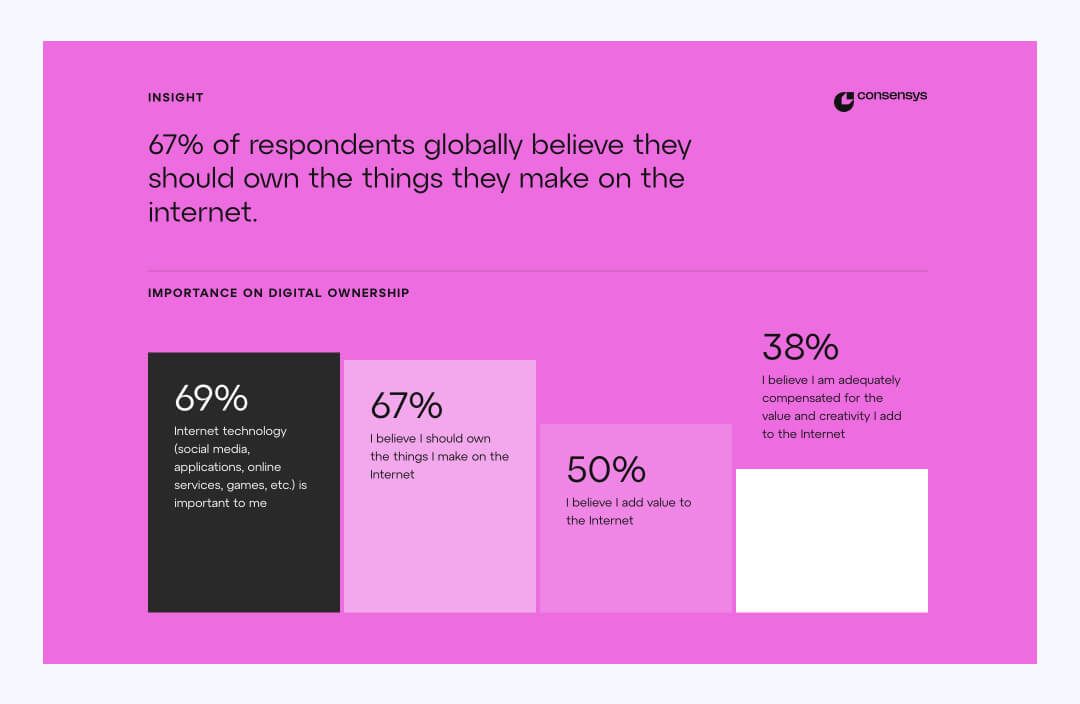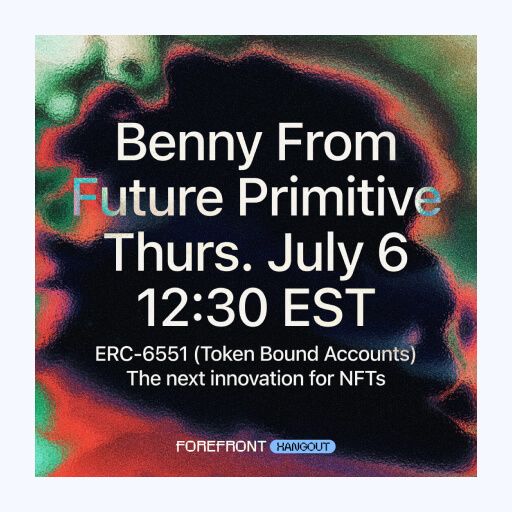Newsletter: Luxury Media
This week we cover Luxury Media, Ruby Thelot w/ Fanfiction <> AI, Variant on onchain advertising models, Azuki controversial NFT launch, The “Songcamp onchain experimentation”, plus Market Trends (web3 survey report), mainstream news (FTX “Reboot”, SEC …) and Signal TL;DR.
By Forefront - Jul 3, 2023
Good morning and welcome to edition 147th of the FF Newsletter.
This week we cover Luxury Media, Ruby Thelot w/ Fanfiction <> AI, Variant on onchain advertising models, Azuki controversial NFT launch, The “Songcamp onchain experimentation”, plus Market Trends (web3 survey report), mainstream news (FTX “Reboot”, SEC …) and Signal TL;DR.
Let's get to it.
👋 Looking for a way to support Forefront? We’re opening up the FF Newsletter to sponsors interested in sharing their company, project, or community with +10,000 of web3’s most curious minds. If you are interested in becoming a sponsor, check out our Sponsorship Page or DM us on Twitter.
Week’s Highlight
As onchain media becomes more accessible, the questions shift from technical to behavioral: Why do people collect? How should brands lean into onchain media? What does a truly internet-native media brand look like?
This week, Forefront core contributor Jihad Esmail published an essay entitled Luxury Media, exploring the role of community in the new media landscape and outlining a framework for the media organizations of the future.
The essay argues that "luxury media" is essentially a return to patronage -- we are not paying for utility, but rather are funding the story, the taste, the culture, and its proliferation. We no longer lack tools for creating content. When content production and distribution is infinite, the important aspect is its primary function in crafting and proliferating culture. In other words, the value of content today comes primarily from its use in cultural production.
In an infinite content environment, media businesses will only survive if they lean into these new realities. The value is derived from the community formed around the brand and the utility of the content it curates in building the brand, rather than the content itself.
Forefront is a great example of an organization leaning into the luxury media playbook: content is free to access, but community spaces are gated. The community actively curates media relevant to tokenized communities and crypto social, and produces artifacts (reports, products, etc.) that proliferate the thesis and brand. In many ways, the luxury media thesis is simply the tokenized community thesis applied to media.
Take Note Building a media business is hard, and seeking venture scale (and taking venture capital) for a media business is not the optimal route. Luxury media offers an alternate path: building a self-sustaining community around a subculture, and inviting creators and curators to co-create the brand and its artifacts. Onchain media gives us the financial tools to make that possible.
What's Poppin'
An Onchain Model for Web3 Advertising
The essay from Variant discusses the potential for onchain advertising business models. While crypto has been hesitant to adopt advertising as a business model, advertising can align the goals of broad product distribution and revenue generation. The open nature of crypto protocols challenges traditional platform models and creates opportunities for the emergence of web3 advertising components such as advertisers, ad protocols, marketplaces, and applications. The essay explores three emerging models in web3 advertising: onchain ads (NFTs as ads and referral links), token-curated ads (using tokens for attention curation), and hybrid ads (combining offchain and onchain data). It highlights the value of attribution protocols in connecting offchain and onchain identities for tracking user activity. The author predicts that platforms that control distribution will likely retain control over their ad experiences, but attribution protocols could still play a role and potentially be acquired by leading crypto social platforms.
A Place For Music and the New Internet to Crash Into Each Other
Songcamp has played a pivotal role in the development of the web3 music ecosystem. From education to incredibly cool onchain experimentation through their "camps," Songcamp has built a brand as a home for folks at the frontier of music and crypto. This piece is a written history of Songcamp, their first camp (Camp Genesis), and the people behind it. It dives into some of the rituals of the early community (Heartbeat calls) and the ideas and hesitations of early members and founders. This is an incredible piece that left us excited for what comes next in the Songcamp community. Be sure to collect!
The Case Against Community Purism
The essay discusses the concept of "community purism," which refers to the belief that there is an ideal form of community. The author, David Spinks, argues that defining community in rigid terms is a fruitless and judgmental exercise. He emphasizes that communities are inherently messy and imperfect, and there is no such thing as a community utopia. Spinks challenges the notion of "true community" and highlights the subjective nature of community experiences. He suggests focusing on whether a community is achieving its stated goals rather than labeling it as "true" or "not true." The essay also stresses the importance of diverse forms of community and warns against expecting deep connections from every community.
For Zora Zine, Ruby Thelot explores the relationship between online fandoms and AI tools, focusing on the concerns raised by fans regarding the use of AI in creating fanfiction. Fans have accused AI writing tools, such as SudoWrite, of scraping their fanfictions without consent. The essay examines the paradox of fans being upset about AI tools performing a similar function to their own fan creations. It delves into the participatory culture of fandoms, highlighting the importance of community, creativity, and the transformative nature of fan content. Ruby also discusses the potential impact of AI on the fan ecosystem, including the fear of automated content replacing fan contributions and the issue of consent. The essay concludes by emphasizing the need to uplift and empower both artists and fan creators in order to maintain a thriving participatory culture, a fascinating take on a culture rooted on the internet.
Azuki Controversial 'Elementals' NFT launch
Azuki released the latest expansion of its NFT ecosystem on Tuesday, raking in $38 million in 15 minutes. Azuki "Elementals" was first teased last week at a holders-only event held in Las Vegas titled "Follow the Rabbit." A portion of the 20,000 NFTs, which are based on the four Azuki elements of earth, fire, lightning and water, were airdropped to holders. Chris Lepensky, data lead at DAO operations firm Utopia Labs, claimed that many Azuki holders were unable to mint due to "website errors and contract issues," calling the experience "a major L." Members of the Azuki community posted a Snapshot proposal to vote on a potential lawsuit, and creation of a 20,000 ETH treasury for Azuki DAO. All in all, this is yet another example of misaligned expectations between community and company.
China's move to control the blockchain
China is taking a dual approach to crypto through its mainland and Hong Kong. While Beijing has banned global crypto networks in the mainland, it is promoting and developing its own versions of next-generation monetary technology with greater government control. Hong Kong, on the other hand, serves as a niche for the global markets of digital assets, competing with other free-market financial hubs. The Chinese Communist Party benefits from Hong Kong's existence as it allows them to exert financial controls internally while impeding capital flight. This approach enables China to keep its economy running on its controlled financial networks while exploring the potential of global crypto networks elsewhere.
Latest on Mainstream...
First, bankrupt crypto exchange FTX is one step closer to relaunching as an entirely new exchange. According to a June 28 report from The Wall Street Journal, FTX restructuring chief John Ray said the company had "begun the process of soliciting interested parties to the reboot of the FTX.com exchange."
Next, exchange operator Cboe on Friday refiled an application with the U.S. securities regulator to launch a Bitcoin exchange-traded fund by asset manager Fidelity, saying it would work with global crypto exchange Coinbase to prevent any market manipulation in the process.
The refreshed filing aims to address concerns raised by the SEC, which told Cboe that its recent filing to list and trade a spot bitcoin ETF from Fidelity was unclear and incomplete, according to a person familiar with the matter. The SEC raised the same concerns with Nasdaq over a recent filing for a spot bitcoin ETF from BlackRock, the person said.
Finally, a federal court has ruled that crypto exchange Kraken must provide the IRS with account and transaction information. The IRS requested this information to investigate potential tax underreporting by users of the exchange.
Signal TL;DR
A Call for More Programmable Retro-Funding for Digital Public Goods
In this essay, Carl Cervone advocates for programmable retro-funding as a solution to funding challenges in open source projects. This approach rewards projects based on impact, promotes transparency, and aligns with the decentralized nature of these initiatives. By adopting programmable retro-funding, we can ensure sustainable funding for digital public goods.
Decoding DAOs activity - The importance of a multidimensional data analysis
The article explores the world DAOs and the importance of understanding their activity through a multidimensional approach. It introduces the DAO Governance Asset Value (DGAV) metric, which combines treasury, governance, and holders metrics to assess a DAO's performance. By analyzing multiple dimensions, we gain valuable insights for informed decision-making and harnessing the potential of DAOs.
▹ Deep Dives - Autonomous World Infrastructure
▹ NFT - Sotheby's Gen Art Program
▹ Collab - WMG x Polygon Labs
▹ New - Introducing Gemma
▹ Fresh Take - Economies As An Ecology
▹ Cool - Loot Chain
▹ Interesting - Paradigm Vs Crypto
▹ Watch - On ERC-7015
▹ Wild - Sbf's Shopping List
▹ Watch - Pragmatist's Guide To Governance
▹ Tooling - Mirror Writing NFTs 2.0
◎ Check out Signal for daily top web3 social headlines
Market Trends
The State of Web3 perception around the world
This week, Consensys published its "Global Survey on Crypto and Web3" report, the product of over 15000 people surveyed across a variety of topics and questions.
The report highlights key findings related to adoption, perception, and usage of blockchain and cryptocurrencies.
-
Ownership: 67% of respondents globally believe they should own the things they make on the internet.
-
Awareness: 92% of participants are aware of crypto.
-
Outlook: Over one-third see crypto's potential as the future of money & digital ownership
-
Data: 70% believe they should profit from their data. And 83% emphasize the importance of data privacy.
Overall, the survey indicates a positive outlook for Web3 and crypto, with increasing interest and adoption. While challenges such as regulatory concerns and scalability issues are acknowledged, there is a positive sentiment towards the future of blockchain.
The report also emphasizes the importance of continued development, collaboration, and regulatory clarity to address these challenges and unlock the full potential of blockchain technology.

Community Updates
Benny from Future Primitive will join the Forefront Community to discuss the potential of ERC-6551 across tokenized communities and onchain media.
When: Thursday, July 6 @ 12:30PM ET

👋 Looking for a way to support Forefront? We’re opening up the FF Newsletter to sponsors interested in sharing their company, project, or community with +10,000 of web3’s most curious minds. If you are interested in becoming a sponsor, check out our Sponsorship Page or DM us on Twitter.
The information in this newsletter is not intended to constitute legal, financial or investment advice and should not be construed or relied upon as such. Any opinions reflected are the opinion of the author(s) of the newsletter only and not necessarily of Forefront. Please DYOR.
